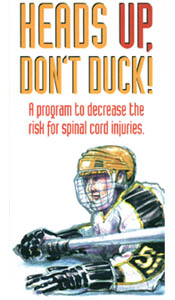
|
Most people do not relate playing ice hockey with spinal cord injuries in the neck – they don't happen often. But when a severe injury like a spinal cord injury does occur, the question is: What preventative measures could have been taken?
PLAYERS ...
- When going into the boards or goal posts, keep your HEADS UP.
- Do not tuck your chin.
- If possible, use your hands, arms, shoulders or facemask to cushion the impact.
- Do NOT check others from behind.
COACHES ...
- Teach proper ways to give a body check and to take a check.
- Do NOT allow players to check from behind.
- Encourage fair play – The purpose of body checking is to separate the player from the puck, NOT to separate the player from consciousness!
- Emphasize neck strengthening and flexibility exercises.
PARENTS ...
- Make sure your child (and your child's coach) is aware of these techniques to decrease the risk for neck injuries.
- Encourage your child to use the HEADS UP technique.
Can Prevention be Expected?
Prevention is usually possible, and should be the first thought in a player's mind when entering the rink. Think of the countless hours spent skating, weight training, stretching, competing, and studying the sport, so the player can be prepared when the referee blows the first whistle at the start of the game. Knowing how to protect yourself against spinal cord injury is no different than knowing which goal to score against.
What Kind of Spinal Cord Injury Is Caused?
 Cervical (neck) spinal cord injuries, though infrequent, can be devastating. These most often occur when a player lowers his head or tucks his chin to his chest, causing the vertebrae (bone segments of the spinal column that surround the spinal cord) to align in a straight line, and then collides head first into either another player, boards, or goal posts. This force (called axial compression) is transmitted to the aligned vertabrae, and, with minimal force, can result in the fracture, or breaking, of one of the cervical vertabrae. when the vertabrae fractures, it can cause compression on the spinal cord, and it is this compression that results in paralysis.
Cervical (neck) spinal cord injuries, though infrequent, can be devastating. These most often occur when a player lowers his head or tucks his chin to his chest, causing the vertebrae (bone segments of the spinal column that surround the spinal cord) to align in a straight line, and then collides head first into either another player, boards, or goal posts. This force (called axial compression) is transmitted to the aligned vertabrae, and, with minimal force, can result in the fracture, or breaking, of one of the cervical vertabrae. when the vertabrae fractures, it can cause compression on the spinal cord, and it is this compression that results in paralysis.
It is rare that this injury occurs when the neck is in a normal or neutral position – HEADS UP!
Is There Any Type of Protective Equipment?
At present, there is no protective equipment that a player can use to prevent a cervical spine injury. Helmets can protect a player from concussions but do not protect against cervical spine injury.
The best form of protection is to be aware of the danger involved and keep your HEAD UP!
For more information ...
|
|
For more information, call:
Alan B. Ashare, M.D., St. Elizabeth's Medical Center
736 Cambridge Street, Brighton, MA 02135
(617) 789-2815
For copies of this brochure, please contact:
The Massachusetts Medical Society at
(781) 893-4610, ext. 1015
Sponsors:
 |
Massachusetts Medical Society |
 |
Massachusetts Interscholastic Athletic Association (MIAA) |
 |
Massachusetts Hockey |
|
New England Ice Skating Managers Association |
|
Illustrations by Scott Williams
This brochure may be duplicated for distribution w/out profit
|
|





